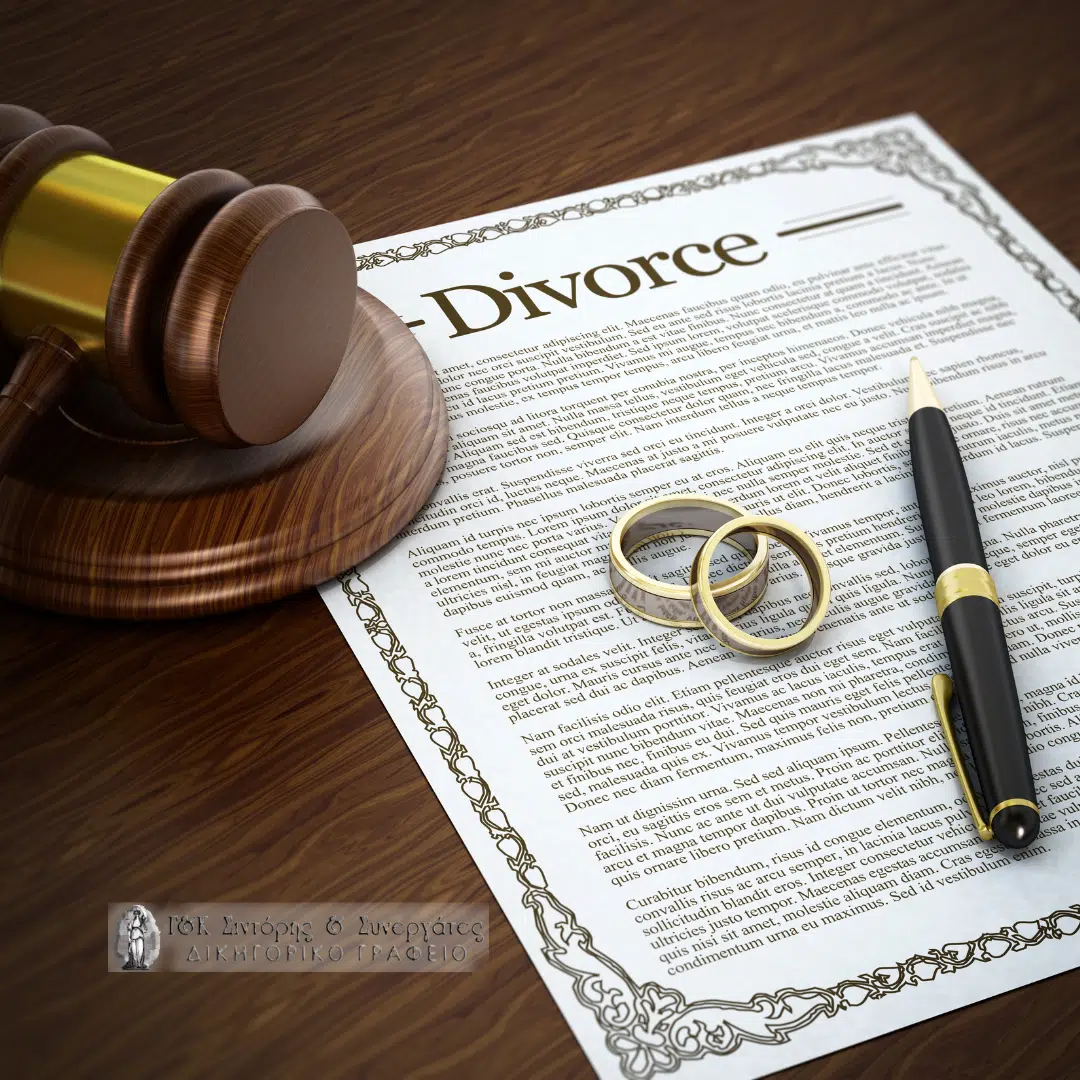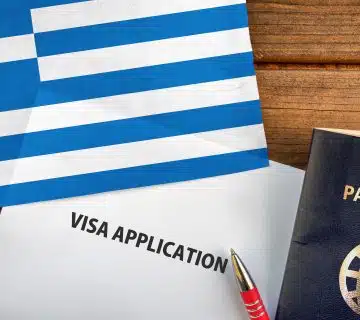Divorce is one of the most important and defining legal proceedings in a couple's life. Whether it is a joint decision or not, it brings with it practical, emotional and legal issues that require serious preparation. In Greece, divorce is regulated by the Civil Code, with provision for both consensual as well as for dispute. Before starting the process, it is good to know what your basic rights are, what your options are and how you can be legally protected.
Types of divorce in Greece
The Greek legal order provides for two main ways of dissolving a marriage:
Divorce by consent
Divorce by consent is the simplest, quickest and least painful process. The two spouses jointly agree on the dissolution of the marriage and, if there are minor children, on custody, maintenance and contact.
As of 2018, consensual divorce becomes without a court order, with notarial deed. It is a prerequisite that the spouses have drawn up an agreement, in the presence of their lawyers, and have completed at least 6 months of married life.
Judicial (adversarial) divorce
If one of the two spouses does not consent, then the dissolution of the marriage takes place through civil proceedings the Single Judge of the Court of First Instance. The divorce action is based on either strong shock of the marital relationship (e.g. infidelity, abandonment, violence), or separation of more than 2 years, which creates a presumption of forced entry.
Legal steps to start the process
The first and most essential step is to consult a family law lawyer. He or she will assess the situation and propose the appropriate type of divorce.
If it is a consensual divorce:
- Written by private agreement on dissolution of marriage and children's issues.
- A deed is drawn up before a notary in the presence of the lawyers.
- Signed and effective immediately.
If it is a divorce with litigation:
- Filed at divorce proceedings to the competent court.
- A trial date is set.
- This is followed by a court decision, which is served and takes effect after the expiry of time limits.
Child custody and child support issues
When there are minor children, the divorce takes on additional legal and emotional weight. The Civil Code provides:
- Edited by: It may be given to both parents jointly or to one of them, depending on the child's best interests. From 2021, the co-curated by is the basic principle, unless proven otherwise.
- Nutrition: The parent who does not live with the child is obliged to pay maintenance. The amount depends on the child's needs and the debtor's means.
- Contact: A communication schedule is set so that the child maintains a meaningful relationship with both parents.
Agreement on these issues can be incorporated into the consensual divorce or resolved in court in the event of a dispute.
Division of property and community property
One of the crucial points in divorce is the fate of the community property. The main points that are regulated are:
- Residence: If the house belongs to one of the two, it can be requested for child custody or necessity.
- Common acquisitions: If there are acquisitions made during the marriage, a 1/2 share can be claimed by the other spouse.
- Loans & debts: Liability is usually allocated according to the signature in the loan agreements.
If there is no agreement, the distribution can be made in a separate legal proceeding (action for participation in the acquisitions).
How long does a divorce take in Greece?
- Divorce by consent: If all the documents are ready and there is agreement, the process can be completed in 1-2 weeks.
- Judicial divorce: They may be needed several months or more than time, especially if there are disputes about children or property.
What happens to spouses' surnames after divorce?
In Greece, the surname of the wife does not change with marriage - remains her maiden name. So, after the divorce, no name change required, as it had not been legally amended. However, if the wife was using the husband's surname for social reasons or had associated it with professional details, it may be necessary to update records, professional documents and social media.
When can compensation for fault be claimed?
In the case of Controversy, if it is proven that one spouse is solely responsible for the serious breakdown of the marriage (e.g. infidelity, domestic violence, abandonment), the other spouse can request compensation for non-material damage.
This action is separate from the divorce and is decided on the basis of evidence and testimony. Although it is not particularly common, it can serve as a means justification in extreme cases.
Second marriage after divorce: Are there any restrictions?
After the divorce is granted, the two ex-spouses are free to remarry. However, the following must first be registered dissolution of marriage at the Registry Office, to be considered final and to update the records.
Especially in the case of a religious marriage, it is required and ecclesiastical cancellation, if a new religious ceremony is to be performed. Legally, however, there is no waiting period or other restriction.
International divorces: What applies when one spouse lives abroad?
If one of the spouses resides permanently abroad, divorce in Greece can proceed normally, if there is Greek citizenship or last common residence in Greece.
However, it is required:
- International performance the action or divorce decree
- Sometimes, document translation and cooperation with lawyers in other countries
- Then you may need to recognition of Greek divorce abroad, if there are issues with insurance or tax rights
The guidance of a lawyer with experience in international family law is then necessary.
Documents and supporting documents
The basic documents required are:
- Marriage certificate
- Certificate of marital status
- Divorce agreement (in case of consensual divorce)
- Identity cards/passports
- Children's birth certificate (if any)
- Notarial deed or divorce action (depending on the procedure)
Psychological and practical preparation
Divorce, even if it is consensual, is emotional event. Before starting the procedure, it is important to:
- Be fully informed about your legal rights
- Consult specialists, not only a lawyer but also a psychologist if necessary
- Focus on children's best interests and in maintaining civilised communication
The importance of an experienced lawyer
The right guidance from a an experienced family law lawyer is the most essential step. The lawyer will:
- Examine each case individually
- Secure your interests legally and financially
- Try to avoid unnecessary tensions and costs
- Direct you to out-of-court resolution if possible
The presence of a lawyer is required in both consensual and judicial divorce.
Conclusion: A fresh start with legal certainty
Divorce, as difficult as it may seem at first, is in fact a very difficult process. an important step towards personal reboot. It is a process that combines strong emotions, legal requirements and practical issues - which is precisely why we should not deal with it impulsively or alone.
Whether it is a joint decision through a consensual divorce or a more complex dispute, the key element is that you feel fully informed and legally protected. A qualified lawyer can guide you through each stage, explain your rights clearly and help smooth the process, avoiding tensions and unnecessary costs.
Especially when there are children, composure, cooperation and responsibility become even more important. The best interests of the children - and maintaining stable relationships with both parents - must take precedence over any personal differences. That is why opting for out-of-court mediation, where possible, is often the best solution for all parties involved.
Divorce may mark the end of a chapter, but it is also the beginning of a new one. A more conscious life, with less conflict and more freedom for personal growth. With the right legal advisor by your side, this transition can be smooth, safe and respectful of yourself and the other person.
Ultimately, it is not the divorce that determines your future - but the way you choose to handle it.



